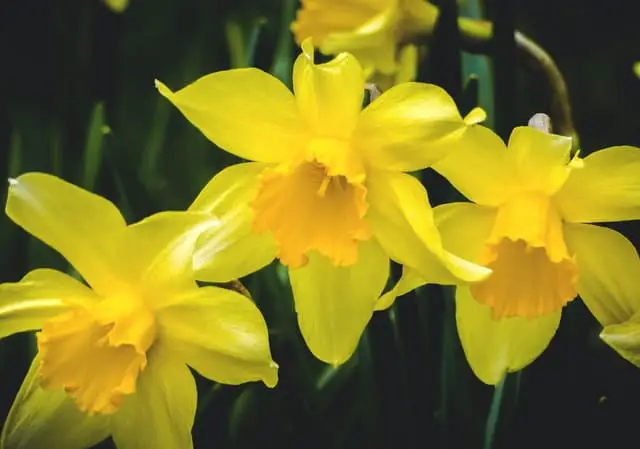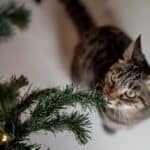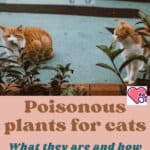
Plants toxic to cats
There are numerous outdoor dangers for our cats especially in the spring period. A season in which nature resumes its life cycle, is reborn and releases colors or new scents. However, not everyone knows this, but there are numerous plants that are a risk for the cat.
Whether they are outdoor plants, houseplants, ornamental plants or flowers, plants produce secretions that can be poisonous or toxic to cats as well as other pets.
Toxic substances that turn out to be poisonous for the cat’s body, causing various reactions, even going so far as to cause the death of the animal.
Indoor plants belonging to the araceae or ficus families or common flowers of the amaryllidaceae family that is the flower or the bulb and plants of the Liliaceae family and the primulaceae have toxic and poisonous substances for the cat.
Araceous plants: dangerous for the cat
Araceous plants contain a substance that is dangerous to cats. The latex contained on the stems and leaves is also toxic to humans. Contains calcium oxalate crystals which can irritate the cat.
The type of allergic reaction varies according to the amount ingested. The animal can bite the plant or it can rub itself and then lick the fur, ingesting the latex left on the fur.
The most common symptoms are:
- hypersalivation and burns in the mouth
- respiratory difficulties
- He retched
- keratitis or corneal ulcers for the eyes,
- wounds on the skin
However, in addition to these symptoms, there may be more serious cases with possible kidney attacks such as nephritis, which arise after a few days and which can prove to be lethal or can cause damage to the nervous system. which appear a few days later and can be deadly. There may also be nerve disorders.
Anthurium
Among other plants toxic to cats and quite common in homes, antharium can prove to be quite dangerous, causing various reactions in cats such as:
- salivation
- diarrhea
- He retched
- bleeding
- respiratory difficulties
Dieffenbachia
Dieffenbachia is one of the most dangerous plants for cats. dangerous for cats.
Leaves as well as latex can cause severe reactions. The stem also has many toxic substances that can be cleared even with a simple watering.
The cat must under all circumstances avoid coming into contact with these substances.
The symptoms are of different degrees:
- apathy
- lack of coordination
- trouble breathing
- swallowing problems
- disorders of the digestive system
- heart rhythm disturbances
- Among the most serious reactions damage to the kidneys, damage to the skin or eyes, and hypersalivation or cases of hallucinations, loss of consciousness and convulsions.
The philodendron
A plant widespread in homes that belongs to the araceae family. Again it can cause allergic reactions to the cat.
Among which:
- respiratory difficulties
- digestive difficulties
- bleeding of the gums
- diarrhea
- He retched
The Ficus: toxic indoor plants
Plants belonging to the ficus family, such as ficus elastica, ficus benjamina or a ficus variegata, are also potential dangers for cats. As with the Acraceae, the latex of the ficus is poisonous to cats. It contains a very toxic substance, photosensitizing furocoumarins, which can even cause permanent damage to the fact.
Among the most common symptoms:
- pain in the prostate
- He retched
- diarrhea
- oral injuries
- facial edema
Amaryllidaceae: poisonous plants for cats
Whether it’s the flower, the leaves or the bulb, plants belonging to the amaryllidaceae family contain a substance called lycorine, which is toxic to cats. It can cause various symptoms such as:
- salivation
- He retched
- diarrhea
- but also nerve problems such as seizures and ataxia
- cardiovascular problems
- hypertension
- altered heart rhythm
Amaryllis
The bulb of this flower is very toxic to the cat and affects the nervous system, causing reactions such as
- coordination problems
- tremors
- vomiting and diarrhea
- cramps
- heart rhythm disturbances
- low blood pressure
Narcissus
A common and widespread flower in spring that contains alkaloids, toxic substances for cats.
If ingested it causes:
- hypersalivation
- He retched
- diarrhea
- In some cases, seizures and sleepiness, cardiovascular disorders
Liliaceae: toxic to cats
As with other plants, lilies contain toxic substances, cardiotonic glycosides. for cats. Both the bulbs and the leaves or the bark of the liliaceae cause irritation, allergic reactions, even causing digestive and nervous system problems. Ingested in large quantities can cause heart problems in the animal.
The lily of the valley
it is particularly dangerous because toxic compounds are in large quantities. Dry plant and pot water can also poison your cat.
Lily of the valley, cures and varieties of a poisonous plant Poisonous
plants for cats: thrush
Kittens and older cats are particularly fragile. Symptoms appear within 6 hours of ingestion: hypersalivation and vomiting, diarrhea, nervous and heart disorders.
The primulaceae

This plant family is also dangerous for cats. Both the leaves and the bulbs contain various toxic substances such as cyclamine and triterpenoid saponin which cause decreased red blood cells and various symptoms such as convulsions, gastroenteritis, even causing the death of the animal.
Cyclamen
It is a popular flower in the gardens and on the balconies of families. Still, cyclamen is very toxic to cats.
It causes several symptoms such as:
- vomiting and diarrhea
- colic
- blood circulation problems
- respiratory paralysis
- jaundice
Succulents: agaves, toxic to cats
Finally, some succulents or cacti also turn out to be poisonous to the cat. Among these, plants belonging to the agave family, such as the Yucca, can be extremely dangerous.
Symptoms include:
- colic
- hypothermia
- hypersalivation
- but also paralysis of the forelimbs






